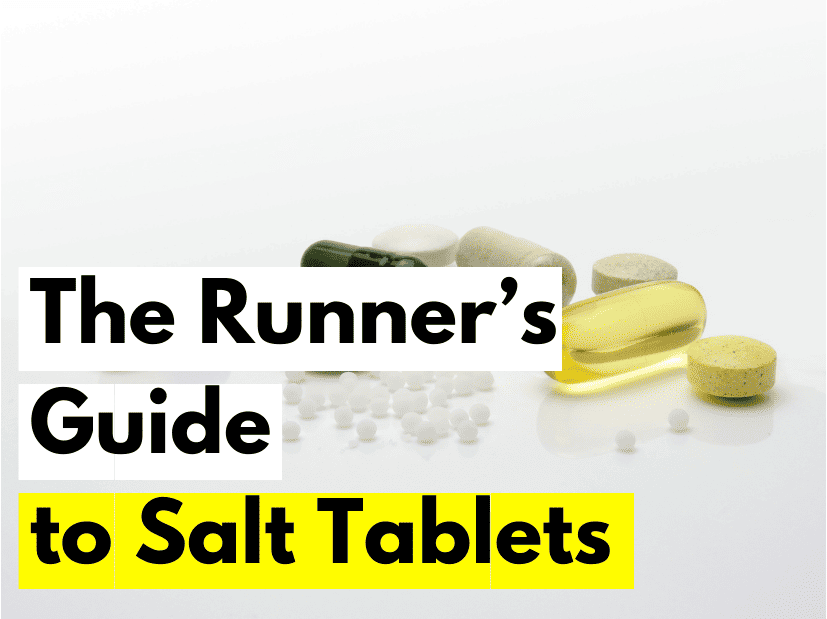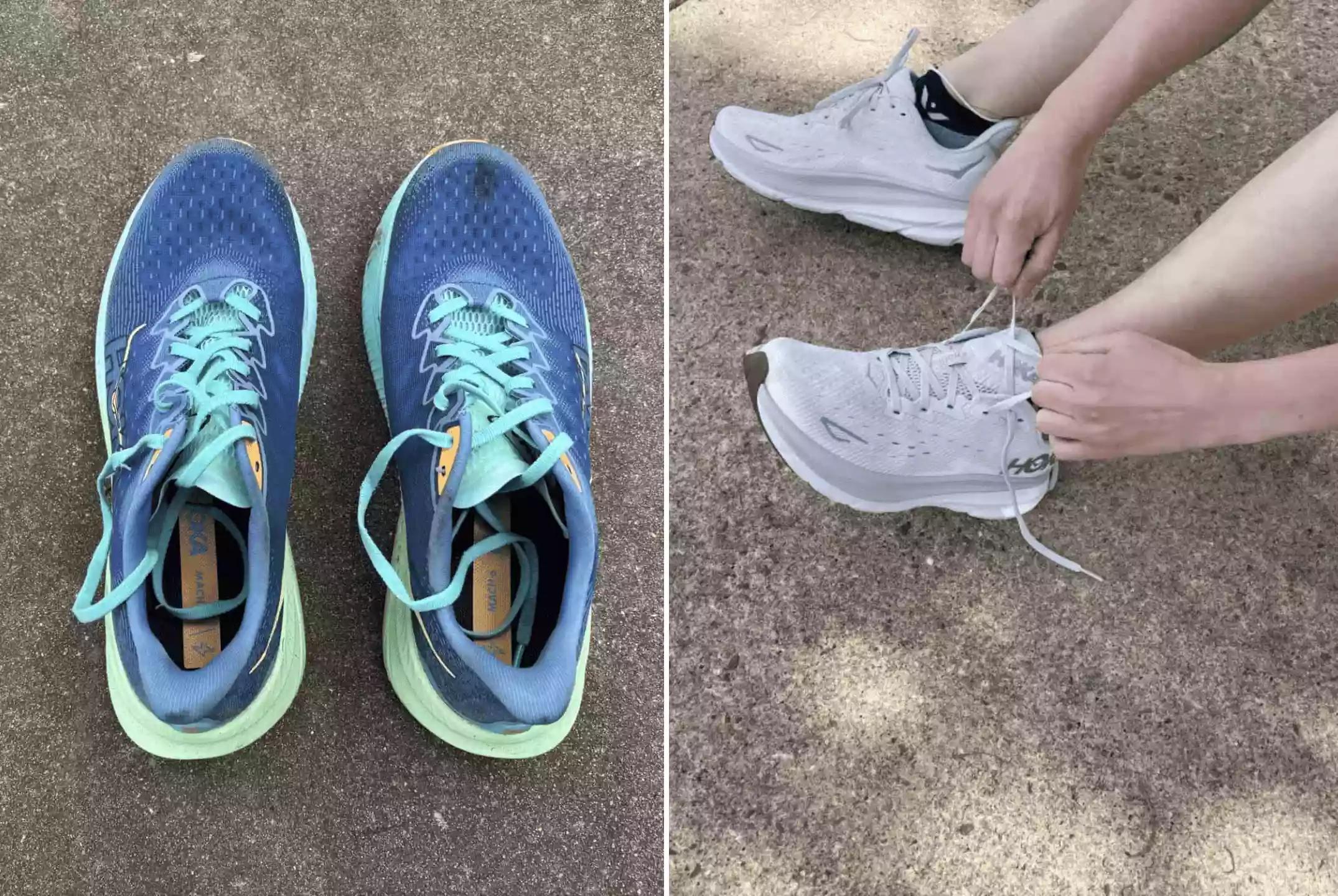Most long distance runners know that carbohydrates and fluids during a half marathon are crucial for any fueling strategy to support optimal performance. It’s often overlooked or forgotten to consider the importance of getting electrolytes in balance before, during, and after a race. It’s even more overlooked how important salt tablets for runners might be to supporting the electrolyte balance.
Electrolytes is a broad term. To be more specific about what’s “an electrolyte” – these are mainly sodium, potassium, magnesium, and calcium.
Electrolytes are important minerals that regulate fluid balance, electrolyte balance, nerve function, and muscle contraction.
For half marathon runners, electrolytes, especially salt, play a crucial role in rehydration, prevention of muscle cramps, and sustaining energy levels.
Ensuring that you have adequate electrolyte levels before, during, and after a run can help improve your running performance.
As a sports dietitian and endurance athlete, I’ve written this article to help you nail your electrolyte replacement and salt supplementation formula.

What are salt tablets?
Salt tablets for runners are supplements that contain various forms of sodium (usually sodium chloride, AKA table salt) and is sometimes combined with other electrolytes like potassium and magnesium.
Salt tablets are designed to help replenish electrolytes lost through sweat during prolonged exercise, particularly during endurance events and in hot weather.
Electrolytes are essential minerals that play a crucial role in maintaining proper muscle and nerve function, fluid balance, and overall health.
Are salt tablets good for runners?
If you are a half marathon runner, marathon runner, triathlete, or ultramarathoner, then yes, electrolyte tablets are important!
In fact, a randomized controlled trial found that half-ironman athletes who took salt supplements had faster finishing times than those who did not take salt supplements.
When long distance running or doing any type of endurance event, your body produces sweat in order to lower your body temperature. The sweat contains not only water (water evaporation cools surfaces) but also electrolytes, especially sodium.
If you lose too many electrolytes through sweating without replenishing them, it can lead to electrolyte imbalances and sodium loss.
These imbalances, when prolonged, can result in muscle cramps, dehydration, fatigue, and in severe cases, heat exhaustion or heat stroke.
Hyponatremia is the medical term for dangerously low sodium. Hyponatremia has serious consequences ranging from bloating, nausea, vomiting all the way to seizures, and sudden death.
Salt tablets for runners are used to prevent these problems by providing a concentrated source of sodium intake, the main ingredient in sweat. They are particularly popular among endurance athletes or those who engage in activities that result in significant electrolyte loss.
If you engage in any cardio exercise that lasts longer than 60 minutes, you need calculated electrolyte replenishment and hydration.
Are salt tablets safe for runners?
Too much dietary sodium increases the risk of high blood pressure.
However, for active endurance athletes, sodium replacement during exercise does not increase the risk of high blood pressure. When used in proper amounts, it contributes to safety.
Speak to your doctor or dietitian if you have high blood pressure and are concerned about side effects from salt replenishment.
How many electrolytes do we lose in sweat?
As you can imagine, the amount of electrolytes lost in sweat is different from athlete to athlete and depends on many things, including sweat rate, exercise intensity, weather, baseline sodium levels, body weight, altitudes, and a handful of other biological and genetic factors.
As a general rule, if you have a high sweat rate (if your shirt has salty white stains after a run on a warm day), you will need additional electrolytes to maintain normal sodium levels.
Another way to assess your hydration status is to weigh yourself before and after your run. For every pound of weight lost, make sure you drink 500mL of electrolyte drink or sports drink.
If you’ve lost more than 3% of your body weight after a 60 minute run, you’ll definitely want to drink more during your runs and take more salt.
What is a sweat test?
To geek out on data and optimize your electrolyte supplementation, take an individual sweat rate test!
A sweat test measures your sweat rate in liters per hour, your electrolyte loss in milligrams per hour, and your sweat electrolyte concentration in millimoles per liter.
Knowing this information can be a game changer to help you better understand your body’s losses and needs.
You can use this data to design a fluid and electrolyte plan for during running that will meet your needs and support your body as a runner so you can feel good, train well, run strong and recover well.
Two brands I recommend for sweat rate tests are hDrop (an arm band that you wear during your run that instantly connects to an app) and Levelen (patches that you wear during your run that you mail back to the company).
How often should runners take salt tablets?
During a run lasting more than 60 minutes, you should aim to take an electrolyte source every 30-60 minutes and 300-600mg of sodium per hour.
For context, one SaltStick salt tablet contains 215mg of sodium and one Nuun Sport tablet contains 300mg of sodium.
At the same time, you should drink 750ml of sports drink every hour, in small sips.
Lemon-lime Skratch Labs powder is my personal recommendation to athletes because it is rich in sodium and carbs.
How do you carry salt tablets on a run?
Carrying salt tablets on a run is super straightforward once you find a method that works for you. Here are some common ways my clients carry salt tablets during their runs
- Put them in a plastic baggie tucked into sports bra or shorts.
- Wear a running belt, such as this one from Lululemon or a FlipBelt and carry your electrolytes in it.
- Get a hydration vest or pack. Many of them come with pockets and compartments for carrying sports nutrition supplements and water bottles. This is what I personally do.
The 4 Best Salt Tablets for Runners
Despite their salty-sounding name, salt tablets don’t taste bad! In fact, many companies make flavorless salt capsules, tasty chews, or delicious fizzy dissolvable tablets. Do your best to avoid salt tablets with sweeteners.
Here are my top 4 recommendations:

SaltStick Fastchews
SaltStick FastChews are chewable supplements that enter the bloodstream quickly. Flavur options include Watermelon, Lemon-Lime, Mixed Berry, Orange, Peach, and Tropical Mango.
Each chewable salt tablet contains:
- 50 mg of sodium,
- 15 mg of potassium,
- 3 mg of magnesium, and
- 5 mg of calcium
There’s a lower concentration of sodium in these tablets, which is great if you’re beginning to experiment with taking salt tablets. Take 1-2 chewable tablets every 15 minutes during activity.

SaltStick Caps
SaltStick Caps are one of the most trusted, budget-friendly, and popular salt tablets for runners. These are the salt pills I use myself during training efforts. They dissolve rapidly into the bloodstream to help replenish electrolytes lost in sweat.
Each electrolyte capsule contains:
- 215 mg sodium,
- 63 mg potassium,
- 22 mg calcium
- 11 mg magnesium
Take 1 capsule every 30-60 minutes during exercise.
Get SaltStick Caps on Amazon.

Nuun Sport Hydration
Nuun Sport Hydration tablets are a great option for heavy sweaters. Throw one tablet into 16 oz of water and wait for it to dissolve (about 5 minutes) and the result is a delicious fizzy drink. Nuun Sport Hydration tabs come in over a dozen flavours that are all vegan. They contain:
- 300 mg sodium
- 13 mg calcium
- 150 mg potassium
- 25 mg magnesium
- 40 mg chloride
The recommended dosage is 1 tablet per hour. Get on Amazon.

LMNT Zero Sugar Electrolytes
If you’re a heavy sweater or live in a hot climate, THIS is the product for you. One serving of LMNT Zero Sugar Electrolytes contains 1000mg of sodium! These sugar-free, keto-friendly, gluten-free sodium supplements pack a punch:
- 1000mg sodium
- 200mg potassium
- 60mg magnesium
The recommended dosage is 1 pouch in 16-32 ounces of water per hour. Get on Amazon.
FAQ
Do salt tablets help runners?
Salt tablets help long distance runners (anything more than 60 minutes) by preventing muscle cramps, dehydration, hyponatremia, and heat stroke.
Should I take salt tablets before running?
Salt tablets will be most effective during a run (because they goal is to replenish sweat losses). During a long run, take your first salt tablet 30 minutes in, and every hour after that.
Is it good to take salt before running?
If you are planning to run in very hot and humid conditions, you may consider pre-loading with a small amount of salt before your run. However, salt tablets will be most effective when taken during a run.
How do you take salt tablets?
Read the label to confirm how much electrolyte salt is contained in the tablet and then calculate your needs based on sweat rate or assume 300-600mg of sodium replacement every hour. Then find a way to carry your salt tablets with you and monitor your body’s response.
How much salt should runners take?
300-600mg of sodium every hour.
What are the benefits of taking salt tablets?
Salt tablets for runners are used to prevent dehydration, cramps, passing out, stomach aches, and brain fog by providing a concentrated source of sodium, the main ingredient in sweat. They are particularly popular among ironman athletes or those who engage in activities that result in significant electrolyte loss.
What is the best way to take salt tablets?
In long events and marathon training, you should incorporate salt tablets into your overall nutrition plan, which may include carbohydrates, other electrolyte sources (e.g., sports drinks or gels), and regular nutrient-dense meals or snacks.
Are salt tablets bad for you?
Athletes lose up to 7 grams of sodium per day in hot climates. Salt tablets are not bad for your heart and blood pressure unless you are taking in more sodium than you are losing through sweat.
Do salt tablets help with muscle cramps?
Yes. Electrolytes like sodium, potassium, calcium, and magnesium are essential for transmitting electrical signals in muscle and nerve cells. Sodium plays a crucial role in muscle contraction and nerve signal transmission, preventing cramps.
–
Everything featured on Half Marathon Guide is independently selected and curated. We may receive a small commission on purchases made from some of our links.




